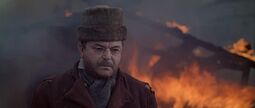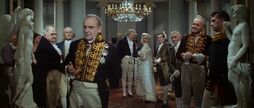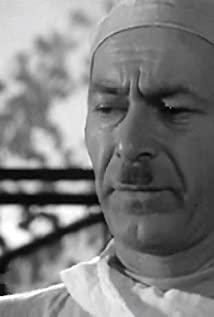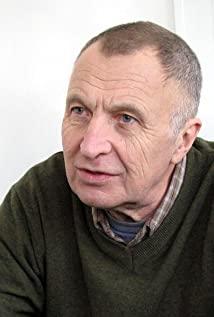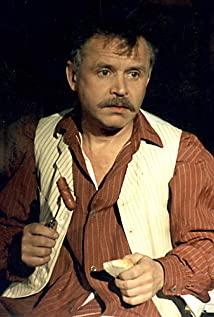-
Narrator: On 12th June, 1812, the forces of western Europe crossed the frontiers of Russia and war began. In other words, an event took place that was contrary to all human reason and human nature.
-
[Prince Andrei is dying]
Prince Andrei Bolkonsky: Natasha... I love you too much. More than anything in the world.
Natasha Rostova: And I! But why too much?
Prince Andrei Bolkonsky: Why too much? Well, what do you think? What do you feel in your soul, deep in your soul? Shall I live? What do you think?
Natasha Rostova: I'm sure of it.
Prince Andrei Bolkonsky: How good that would be.
-
Narrator: And not for this day and hour alone were the mind and conscience of this man darkened, on whom the burden of events weighed more heavily than on all the others who took part in it. Never, to the end of his life, had he the least comprehension of goodness, of beauty or of truth, or of the significance of his actions, which were too contrary to goodness and truth, too remote from everything human for him ever to understand their meaning. He could not disavow his deeds, lauded as they were by half the world, and so he was obliged to renounce truth and goodness and all humanity.
-
[the Battle of Borodino drags on]
Narrator: Enough, enough, men. Stop, consider, what are you doing? Into the minds of tired and hungry men on both sides, a flicker of doubt began to creep. Were they to go on slaughtering one another? Kill whom you like, do what you like, but I've had enough. Yet some inexplicable, mysterious power continued to control them, and the terrible business went on, carried out not by the will of individual men.
-
Narrator: A moral victory which compels the enemy to recognize the moral superiority of his opponent and his own impotence was won by the Russians at Borodino. The direct consequence of the Battle of Borodino was Napoleon's flight from Moscow, the destruction of the invading army of 500,000 men, and the destruction of Napoleonic France, on which was laid for the first time, at Borodino, the hand of an opponent stronger in spirit!
-
Narrator: I want only to say that it is always the simplest ideas which lead to the greatest consequences. My idea, in its entirety, is that if vile people unite and constitute a force, then decent people are obliged to do likewise; just that.
-
Narrator: Thoughts that have important consequences are always simple.All my thinking could be summed up with these words: Since corrupt people unite among themselves to constitute a force,honest people must do the same.It's as simple as that.
-
Tushin: Uncertainty, that's what one fears most.
-
Narrator: According to a popular belief, the fewer people know about the suffering of a woman in labor the less is her suffering.
-
Prince Andrei Bolkonsky: How can you be sure what will do harm to another man?. Personally, I know of only two real evils in life: Remorse and sickness.And happiness is the absence of those two evils.
-
Natasha Rostova: I think that when one goes on remembering and remembering,one remembers till one recalls what happened before one was in this world.
Sonia Rostova: That's metempsychosis.
-
Prince Andrei Bolkonsky: Yes, I told you that one should forgive a fallen woman.But I never said I would be able to.I can't forgive.
-
Platon Karataev: Well, though it's the worm that gnaws the cabbage, it's first to die.
Pierre Bezukhov: What was that you said?
Platon Karataev: I say it's not by our wit, but as God thinks fit.
-
Platon Karataev: Lord, lay me down like a stone and raise me up like new bread.
-
Emperor Napoleon Bonaparte: Uncertainty, that's what one fears most.
-
Natasha Rostova: I think that when one goes on remembering and remembering,one remembers till one recalls what happened before one was in this world.
Prince Vasili Kuragin: That's metempsychosis.
-
Platon Karataev: Well, though it's the worm that gnaws the cabbage, it's first to die.
Tushin: What was that you said?
Platon Karataev: I say it's not by our wit, but as God thinks fit.
-
Prince Bagration: Uncertainty, that's what one fears most.
-
Natasha Rostova: I think that when one goes on remembering and remembering,one remembers till one recalls what happened before one was in this world.
Ilya Andreyevich Rostov: That's metempsychosis.
-
[first lines]
Narrator: All ideas that have momentous consequences are always simple. My idea is that if evil men are linked with one another and are thereby made strong, then honest men, too, must do likewise. It's as simple as that.
-
Pricess Lisa Bolkonskaya: My husband is deserting me. He is going to his death. Why must we have this nasty war?
-
Pricess Lisa Bolkonskaya: Why cannot men do without war? How is it we women are content with things as they are?
-
Pierre Bezukhov: Here we have this war with Napoleon. If it were a war for freedom, I would understand it and I would be the first to join the army. But I am against helping England and Austriato fight the world's greatest man. That's not right.
Prince Andrei Bolkonsky: If we only fought for our convictions, there'd be no war.
Pierre Bezukhov: Ah, that would be perfect!
Prince Andrei Bolkonsky: Perhaps perfect, but hardly possible.
-
Pricess Lisa Bolkonskaya: I often wonder why Annette never married. You men are foolish not to have married her. You are incapable of appreciating a fine woman.
-
Pierre Bezukhov: What are you going to war for?
Prince Andrei Bolkonsky: What for? I don't know. It's necessary.
-
Prince Andrei Bolkonsky: Never marry, my friend. That's my advice. Do not marry until you can say to yourself that you have accomplished all you intend to accomplish and until you have ceased being in love with the woman of your choice and you can view her clearly. Or you'll be making a cruel and irrevocable mistake. Marry only when you are a useless old man, for everything that is good and noble in you will be lost.
-
Prince Nikolai Andreevich Bolkonsky: Thank you. Thank you.
Prince Andrei Bolkonsky: Why should you thank me?
Prince Nikolai Andreevich Bolkonsky: For not hanging back, not clinging to your wife's petticoats, for putting service first. Thank you. Thank you.
-
Pierre Bezukhov: I must try to understand her, make up my mind as to what she is really like. Was I mistaken before or am I mistaken now? No, she isn't stupid. And she is beautiful.
-
Prince Andrei Bolkonsky: I long to be known to all people and to be loved by everyone. Am I to be blamed for wanting that, for living for glory? Yes, for that alone!
-
Prince Andrei Bolkonsky: I will never admit it to a soul, but what am I to do? Death, wounds, the loss of my family - all this is nothing! I'd give everything for a moment of glory, for an instant of triumph, and the love of people I do not know nor will ever know.
-
Prince Andrei Bolkonsky: What if there were nothing left but to die? Well, if I have to, I will die as bravely as anyone.
-
Prince Andrei Bolkonsky: How quiet, peaceful. How majestic. How different from all the running, shouting, and fighting. How is it I never noticed that glorious sky before? How happy I am that I have seen it at last. Yes, all is vanity. All is false except for that endless sky. Nothing exists but the sky. And even the sky does not exist. There is nothing...
-
Prince Nikolai Andreevich Bolkonsky: He was killed in a battle in which Russia's finest men were massacred along with Russia's glory. Go and tell Lise.
-
Pierre Bezukhov: Stupid. Stupid. Stupid. Death. Death and lies. Stupid. Stupid! Death and lies. Lies.
-
Pierre Bezukhov: [repeated line - to self] You see nothing thorough those glasses of yours.
-
Hélène Bezukhova: Why did you believe that he was my lover? Because I enjoy being with him? If you were nicer and more clever, I might enjoy being with you.
Pierre Bezukhov: Don't speak to me. I beg you.
Hélène Bezukhova: Why shouldn't I speak? It's a rare woman that wouldn't have taken a lover, with a husband like you.
-
Pierre Bezukhov: Thank God I did not kill the man.
Prince Andrei Bolkonsky: Why? Killing a vicious dog is a good deed.
Pierre Bezukhov: It's evil to kill a human being. It's wrong. It's not fair.
Prince Andrei Bolkonsky: Why is it unfair? We cannot judge what is fair and what is not. Men have always erred in their judgment. They always will.
-
Pierre Bezukhov: It is wrong to do evil to another human being.
Prince Andrei Bolkonsky: How do you know what will do harm to another man? I know only two evils in life: a bad conscience and a sick body. Happiness consists in their absence. One must live for oneself, avoiding these two evils. That is my philosophy now.
Pierre Bezukhov: How is it possible to live only for oneself? No! A thousand times no! I feel, deep within my soul, I am an integral part of a vast whole. I feel I cannot vanish without a trace. Nothing vanishes! I always have existed and always will.
-
Prince Andrei Bolkonsky: The only thing that convinces me is life and death. That's what convinces me. What is convincing is seeing someone dear to you, someone dependent upon you - who you have injured and with whom you had hoped to make it right - and then that someone is seized with pain and agony and ceases to be. Why? There must be an answer.
Pierre Bezukhov: Yes, of course.
Prince Andrei Bolkonsky: I am only saying it is not logic that convinces. What convinces is seeing someone close to you disappear - there - into nowhere, leaving you staring down into the abyss. And I starred into it.
-
Pierre Bezukhov: We must live. We must love. We must believe that we are living not just on this patch of earth, but we have lived and will go on living forever.
-
Prince Andrei Bolkonsky: Spring. And love. And happiness. Haven't you grown weary of this foolish, senseless illusion? Over and over again, and all sheer illusion. There is no Spring. No sun. No happiness. I don't believe in your hopes and illusions.
-
Natasha Rostova: Sonya, how can anyone sleep? See how lovely it is. How wonderful the world is! Wake up, Sonya! There never has been a night like this. Look at the moon. How simply perfect. Come here, my dear. Come. Do you see?
-
Prince Andrei Bolkonsky: No! My life is not over at the age of 31. It is not enough for me to know all that is inside me.
-
Prince Andrei Bolkonsky: I want everyone to know me so that my life is not to be lived for myself alone. It must cast its reflection upon the lives of others so that we may live in harmony.
-
Narrator: In June 1807, in Tilsit, Emperor Alexander met with Napoleon. Meanwhile, life - real life as lived by people with its essential interests of health and sickness, toil and rest, and its intellectual interests in science, poetry, music, with its love, passions, friendship and hatred - went on as usual regardless of whether political relations with Bonaparte were hostile or not.
-
Natasha Rostova: Stop laughing. You're shaking the bed. You're awfully like me, just such a another giggler!
-
Natasha Rostova: Do you think he's very much in love? Was anybody ever in love with you like that? And he's very nice. Very, very nice. But he's not quite to my taste. He's so narrow, like the dining-room clock.
-
Natasha Rostova: Is it possible no one will come up to me? Is it possible no one will notice me?
-
Natasha Rostova: Do you ever feel as if there were nothing more to come? Nothing. Everything good has already happened. Doesn't it make you sad?
-
Natasha Rostova: There is today, there is tomorrow, there is eternity. And there was yesterday and the day before.
-
Anatol Kuragin: You don't know what I'm going through.
[places his friends hand on his heart]
Anatol Kuragin: Feel how it's beating! What little feet! What eyes! A goddess!
-
Maria Dmitrevna Akhrosimova: You shameless hussy! You are a nice one. Such a nice one! Meeting your lovers in my own house! Stop pretending! Listen when I speak to you! You've disgraced and demeaned yourself. Like a common wench!
-
Pierre Bezukhov: Amuse yourself with women like my wife. There, you're within your rights. They know what you want of them. They are armed against you by the same experience of debauchery. But to promise an innocent girl to marry her - to deceive, to abduct her. Don't you understand that's as despicable as beating an old woman or a child?
Anatol Kuragin: I don't know about that.
-
Prince Nikolai Andreevich Bolkonsky: Russia is lost. They've ruined her.
-
Field Marshal Kutuzov: Advisers, advisers. There are always plenty of advisors. But not enough real men.
-
Field Marshal Kutuzov: Everything moves too fast. Nothing is accomplished in haste. It's easy to take a fortress, but hard to win a campaign. That requires patience and time.
-
Field Marshal Kutuzov: I made the Turks eat horsemen. Give me time and the French shall eat it too. Take my word for it. I'll make them eat horsemen!
-
Prince Andrei Bolkonsky: He knew that tomorrow's battle was to be the worst he had ever taken part in. And the possibility of death, vividly, clearly presented itself to him.
-
Prince Andrei Bolkonsky: My country. The fall of Moscow. Tomorrow, I shall be killed. Then why this trial when tomorrow I shall cease to exist? I won't exist, so who is this trial for? New conditions of life will begin about which I will know nothing. I will cease to be. I will no longer exist. I will no longer exist.
-
Prince Andrei Bolkonsky: Success does not depend on positions or weapons nor even the number of men.
Pierre Bezukhov: Then on what?
Prince Andrei Bolkonsky: It depends on the feeling within me, within him, within every soldier.
-
Prince Andrei Bolkonsky: They surrendered all of Europe to Napoleon and now come here to teach us. Fine teachers.
Pierre Bezukhov: So you think we will win tomorrow's battle?
Prince Andrei Bolkonsky: Yes, but if I had it in my power, I would do one thing. I would take no prisoners. The French destroyed my home and mean to destroy Moscow. They have insulted me and continue to insult me every second. They are my enemies. They are criminals. Timokhin thinks as I do. The whole army too. We must punish them. They plunder and kill our children. How can we talk about rules of war and mercy? We must take no prisoners, but kill and be prepared to die.
-
Prince Andrei Bolkonsky: War is not about decency. It is the lowest thing men stoop to. One must realize and not make a game out of war. War is a dreadful necessity. Cast off the lies and see war as war. It is no game. Men come together, like they will tomorrow, to murder one another. They will kill each other, maim thousands upon thousands and then hold sacred services and offer up their prayers for having killed so many human beings. And they'll exaggerate it in the retelling and embellish the victory. The side that kills the most people wins the most honors. Whoever succeeds in killing the most people gets the greatest rewards. How can God bear to witness such things?
-
Prince Andrei Bolkonsky: What will happen to us tomorrow? To me, tomorrow is simple. 100,000 Russian soldiers and 100,000 French soldiers will meet in combat. Those 200,000 are going to fight. The side that is fiercest and spares itself least is the side that will win. Tomorrow, whatever the circumstances, we are certain to win.
Timoshin: True, very true, Your Excellency. We'll not spare ourselves. The men in my battalion wouldn't touch their vodka. "This is not the day for that," they said.
-
Prince Andrei Bolkonsky: Can this be death? I can't. I don't want to die. I love life! I love this grass, this earth, this air!
-
Field Marshal Kutuzov: The enemy is defeated! Tomorrow, we'll begin driving him out of our holy Russia.
-
Rambal: You are fine enemies, though. Fine men. Our king of Naples knows good men, and he cried, "Bravo! Soldiers, like ourselves!"
-
Rambal: Fearsome in war, gallant with the women - that's the French! Is it true that all the women have left Moscow? What a curious idea. What had they to fear?
-
Rambal: Your ladies, they are said to be beautiful. Why flee to the steppes when the French army is in Moscow? What a chance they have lost. Your peasants, I understand, but your civilized people ought to know better. We have taken Vienna, Berlin, Rome, Naples, Madrid, Warsaw - all the capitals of the world. We are feared, but loved. We are worth knowing.
-
Narrator: This, ladies and gentlemen, is the burning of Moscow. There go Suschevsky and Rogozhskaya.
-
Sonia Rostova: How awful! I believe all Moscow is burning. What a terrible glow.
-
Emperor Napoleon Bonaparte: Soldiers! Thanks to you, the Italian army of Austria - which had the insolent pretension of shattering my crown - is now defeated, annihilated, exemplifying the truth of my motto: Dil la mi diede, guai a chi la tocca. "God hath given it to me. Woe to whomever touches it!"
-
Emperor Napoleon Bonaparte: Soldiers! You must wish to return to France only by the path of honor. And we shall return to our homeland, marching in triumph!
-
Field Marshal Kutuzov: Hurrah, lads! I thank everyone for your hard and faithful service. Our victory is complete! Russia will not forget you. Your glory will live forever!
-
Field Marshal Kutuzov: Brothers, I know it's hard on you. But there's nothing we can do. Be patient. It will soon be over. We'll see our guests out, and then we shall rest. It's hard on you, but you're at home. But for them? You see what they've come to. Worse than the lowliest beggars. When they were strong, we didn't spare ourselves. But now, we can spare them. They're human beings too. Right, lads? But after all is said and done, who asked them to come here? It serves them right to have their snouts pushed into the mud.
-
Narrator: Only now has Pierre discovered, not with his intellect, but with his whole being and his life, the man is created for happiness. He looked around him with joy and contemplated the ever-changing, always majestic, incomprehensible and infinite life.
-
[last lines]
Narrator: And I say, let us take one another's hand, all people who cherish goodness, and let there be only one banner - that of active virtue. I mean to say only that all ideas that have momentous consequences are always simple. My idea is that if evil men are linked with one another and are thereby made strong, then honest men, too, must do likewise. It's as simple as that.
-
Pierre Bezukhov: If I were not - what I am, but the handsomest, most clever and best man in the world - and if I were free - at this moment I would be on my knees to beg for your hand - and your love.
-
Russian Soldiers: [singing] The maidens went to the river to bathe, The maidens went to the river to bathe, Bumblebee, bumblebee, Wonder, wonder, wonder-bee, That was Lusha, my honeybee...
-
Emperor Napoleon Bonaparte: What about the Russians?
French Officer: Standing firm, Your Excellency.
Emperor Napoleon Bonaparte: So they want more? Give them more.
-
Soldiers: [singing] Long live Henri IV, Long live this valiant king, This fourfold devil, With the three talents, Of drinking, fighting, and womanizing, I love the ladies, And I love good wine, I love the ladies, And I love good wine, For all jolly fellows, This is our song, I love the ladies, And I love good wine...
War and Peace Quotes
-
Elyse 2022-04-24 07:01:23
1: The narration from the perspective of God penetrates into the heart, considers conscience and lies, death and truth, and self-doubt is full of oblique lenses from a subjective perspective. Such a question of destiny in the face of the ultimate human problem can only come from Tolstoy. The war scene scheduling is tragic and epic, and the aerial photography is amazing and cannot be replicated. 2: "Natasha's Dance" - walking through the ball with colorful flowers, the golden snow fell silently, we thought that when we encountered love, the world would be so beautiful; the world is only half bright because of you. Pierre's confession is too tear-jerking, if I shall go on. 3: The real shot is amazing, the panorama sweeps across the world, and the panning long mirror shuttles, how much effort does it take to rehearse and control it! Was crushed by a wave of rumbling noises. Personal destiny is embedded in the growth rings of the times, so insignificant, humble and hopeless. 4: From the perspective of the cloud, you can finally see the joys and sorrows of the world. The great life is endless, the great dream is endless, and it is as deep and broad as the earth. The director's selection of the original work and the camera's expression of consciousness have a strong style identification, and the experimentation beyond the conventional gives it a profound and magnificent image.
-
Florence 2022-04-24 07:01:23
[Beijing Film Festival Screening] 2K restored version (suspected to be converted to 4K). The four seven-hour epic masterpieces filmed by the Soviet Union's entire country's human, material and financial resources are also a rare big-screen viewing experience. Especially the photography is the most shocking. In that era without Steadicams and drones, 70mm film used roller skates, slings, aerial photography and other methods to shoot incredible and amazing schedules. The grand opening, the gorgeous dance, the grand war, The chaos of burning the city is very prominent. The three protagonists brilliantly interpret the vigorous, vodka-like fiery emotions of Pierre, Natasha and Andre during the war. It embodies the subjective choice, resistance and strength of individuals under the torrent of the era of great change, which is touching. The editing perspective has a poetic stream-of-consciousness color, oak trees, comets, all are people's inner desires. The director even added in his own near-death hallucinations after a heart attack. The war is too long and unreasonably large and lacks details, and the ending unfortunately falls into the slogan of promoting ideology and nationalism, weakening the emotional storyline of the protagonists. Four and a half stars
Director: Sergey Bondarchuk
Language: Russian,German,French Release date: April 28, 1968

